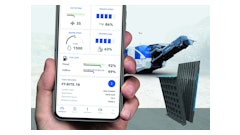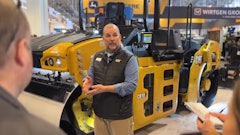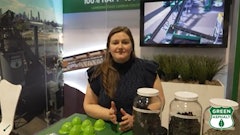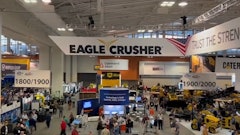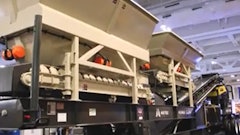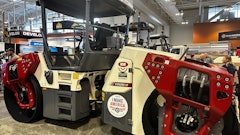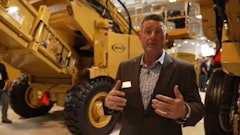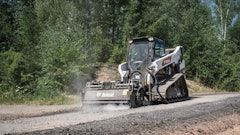
Sunbelt Sealing Inc. Operations Manager Jeff Marshall polled his supervisors about what makes the Jackson, MS, contractor different from the local competition, and the answer he liked best was the shortest: “We rock!” one supervisor told him.
“I asked what he meant by that and he said that’s something they’ve heard from our customers,” Marshall says. “We’re told that our guys pull up on the jobsite and get out of their trucks and they don’t’ stand there scratching their head. They get right at it and hit the ground running.”
That’s a great image for any contractor to have, but dig a little deeper with Marshall and owner Joe Lauderdale and they begin to discuss what it is that enables the crews of the pavement maintenance contractor to mobilize like a SWAT team as soon as they roll up on the job.
“You have to give customers good value and save them some money, otherwise they won’t have any use for your services,” Lauderdale says. “If you do a good job and help save them money then you’re valuable to them. They’ll not only call you back but they’ll tell other people about you – and referrals are a big part of our business.”
Complementing Services
Started in 1982, Sunbelt Sealing Inc. celebrated its 30th anniversary last year, but the celebrating company is substantially different from the original sealcoating start-up that focused on sealcoating and sealed cracks with a cold pour product only as they came across them on a job.
“We soon realized that that approach wasn’t going to help us survive,” Lauderdale says, so he began slowly adding services that complement the services he offered and met the needs of an ever-expanding customer base. “We added all these things over the years out of necessity. People would call and ask ‘can you do this?’ and we figured out a way to do it.”
Today the full-service pavement maintenance contractor offers sealcoating, pavement rejuvenation, and an array of services short of paving to airports, DOTs and private properties throughout Mississippi and Louisiana. The company employs up to 25 people during peak season and generally runs two or three crews depending on the type of work and the size of the project. Lauderdale says Sunbelt operates as a subcontractor on most DOT work and frequently as a general contractor on other jobs.
Lauderdale and his son John are both licensed civil engineers, Marshall has a degree in industrial technology, and a lot of people with the firm in key positions have a college education. In addition, more than half of the company’s crew has been with Sunbelt since 2008 or longer.
“Our associates are real quick studies and they know how to communicate,” Lauderdale says. “They know how to communicate with the customer and out on the job. All of my associates are really good people.”
He says in 1983 Sunbelt Sealing branched into sealcoating runways, taxiways and aprons at airports. “Then we did a little work on concrete runways and because some of the runways had spalling we got into epoxy repair to prevent FOD (foreign object debris),” he says. Soon the contractor added hot pour cracksealing, and Sunbelt still has its original Crafco melter/applicator in the yard “though it’s been cannibalized a little.”
“We were doing cracksealing with cold pour until late 1983 or 1984 when we bought our first hot pour cracksealing machine,” Lauderdale says. “We bought a pallet of material to start with and the salesperson gave us an additional pallet because he said we were going to make mistakes as we learned and would need more …and he was right.”
But hot pour cracksealing soon helped Sunbelt Sealing grow its sealcoating business, and late in 1985 the company started sealing joints in concrete, primarily on highways and airfields. An outgrowth of that is pressure grouting using Portland Cement Grout (PCG) to stabilize concrete slabs that have voids beneath them.
“We got into that because we were sealing joints in concrete and we were getting failures and we couldn’t figure out why,” Lauderdale says. “We finally realized the reason our work was failing was because the slabs were moving, and they were moving because they had voids beneath them. So we added that service to stop them from moving or to raise them and that also improved our joint sealing, making it last longer.”
Around 1992 Sunbelt started sawing and sealing joints in asphalt overlays on concrete panel pavement roadways to prevent the concrete joints from reflecting through and damaging the overlay, and recently Sunbelt added, again complementing its existing services, polyurethane foam undersealing. “That process does essentially the same thing as PCG slab stabilization – raising slabs and filling voids beneath concrete to stabilize them – but it cures in minutes,” Lauderdale says. “You have to wait three hours for Portland Cement grouting to cure for traffic use and often we had to leave a crew out there until it was ready. But with this you can just about pack up and open the lane after you’re done, it’s that fast.”
Lauderdale says the amount of each type of work varies significantly from year to year depending on many variables including the economy and budgets, but he says the company’s approach to business has helped it have solid years – even during the recent recession.
“That’s why we provide them different services, because we want to be ready if one of the things we do is more popular and needed more than another we want to have the equipment and the manpower and the know how to jump on it,” Lauderdale says.
Communicate for Comfort
“To us ‘quality’ means you do a good job, you save the customer money, and you have something you can look back on proudly,” Lauderdale says, and a vital part of providing that quality is the company’s across-the-board communication emphasis.
“Communication with a capital C is important,” Marshall says. “We try to communicate throughout every job because people like that. They feel more comfortable if they know what’s going on.”
He says communication starts in the bid process and is important partly because the contractor isn’t going to be the low bid all the time. “We are very honest with them from the start because we believe that if they have a good feel for us -- a warm and fuzzy feeling for us -- that even if we’re a couple of cents higher we’ll still get the work -- and we often do,” Marshall says.
Lauderdale says many times Sunbelt is recommended to potential customers by consulting engineering firms Sunbelt has worked with before “because we can fix a problem.”
“But if we can’t fix the problem we’ll tell them,” Lauderdale says. “If we’re out there to bid a sealcoating and cracksealing job and we find there are too many cracks to make it worthwhile to fix, even if they want us to fix it we’ll just tell them that it’s in too bad a shape and they really need to get it milled and overlaid or whatever the best action would be.
“People like you to shoot ‘em straight,” he says. “We’ve probably talked ourselves out of a number of projects because we didn’t think that what the customer wanted was what the customer needed.”
Communication also plays a role in scheduling. “It’s huge when you’re dealing with a small business,” Marshall says. “There are so many variables that can change when a job is started that we believe everyone involved should stay informed, and we try to give everyone a week’s notice if possible. Then when we schedule a job we make sure we show up when we say we’re going to.”
Once the job is set to go Marshall will sit down with the supervisor or foreman to show him what he’s up against, communicating all the job background and specifics.
“The supervisor might never have laid eyes on the job he’s going to run so we sit down to make sure he knows everything he needs to know and give him a chance to ask any questions he might have,” Marshall says. He says the conversation covers everything from the contact person at the site and the size of the crew he will take to which tools, which equipment, and how much material will be needed. “Otherwise if he doesn’t know everything he needs to know and have everything he needs when he gets out there he either has to come back to get it or go buy it somewhere else,” Marshall says.
And communication continues throughout the job process.
“If we are sending an invoice and it’s more than we estimated we make sure that’s not a surprise to the customer,” he says. “It’s hard to estimate exactly the number of cracks and how much gravel or grass is in them and how long that will all take, especially if there are cars parked on the lot when you go to make the estimate. So we let them know up front that it’s just an estimate and that along the way we will let them know as things change, and if we find something as we go we keep them informed. There’s no question they appreciate that.”
But communication doesn’t end until follow up is done.
“Closure on a job is important,” Marshall says. “Once the work is complete the supervisor lets me know and hands me the quantities and the job costs and I do a final inspection with the owner or inspector where I can – not on all jobs but on as many as I can. It closes the deal and leaves everything on a good note. Closing is as important as opening in my opinion.”
Checking Quality Every Day
To get to that effective closure Sunbelt Sealing relies on daily quality control efforts in which Marshall or the job supervisor does a quality control check at the end of each day instead of waiting until the end of a job.
“Jobs are different and on private jobs the end of the job might be the end of the day, but we check job quality every day and there’s a reason for that,” Marshall says. “If you’re working on an airport and you’re cracksealing 50,000 linear feet of crack it’s easy to miss one. And if you don’t walk the job every day it’s hard to see that one crack you missed.
“If we’ve done our quality checks the way we’re supposed to, when we get to the end of the job we’ve already done a quality check on 98% of the work and we only need to check a little bit instead of walking and examining the whole job. When you have to check the entire job at project end, it’s easy to overlook something.
“So we walk our jobs every day to avoid that from happening. We don’t want the engineer or the owner to be the one to tell us ‘you missed a spot,’ especially after we’ve already sent him the invoice and told him the job is all done. Plus it eliminates having to go back and correct something so it saves money.”
If at all possible Marshall walks the finished job himself before an invoice is sent. And if for some reason he can’t do it (if the job is out of town, for example) the supervisors are trained and authorized to conduct the final quality control check. “On out of town jobs the supervisors are trained to do all that. They aren’t sitting in the truck listening to the radio. They’re out there on the job.”
Once the job is complete and the quality check has been made, Marshall communicates that to the job inspector or property owner. “Good communication makes us look better to our clients because they aren’t discovering a problem that we should have found,” Marshall says. “It helps us look good.”
[SIDEBAR]
Safety at Sunbelt Sealing
Sunbelt Sealing, Inc. operates what Jeff Marshall, operations manager, describes as “an extensive safety training program because safety is our number one priority.”
The start of the safety effort was a comprehensive drug policy the company instituted 20 years ago that included pre-employment drug testing, random drug testing and mandatory post-accident drug testing. “This zero-tolerance policy further enhances our safety program,” says Joe Lauderdale, owner.
Since then Sunbelt has developed a comprehensive program designed to keep employees safe and to keep insurance costs as low as possible.
“All our employees get their safety training in-house,” Marshall says. “We want to make all the guys more conscious about safety and we don’t want anyone hurt on the job, so we take safety seriously.”
In addition to initial safety training the company holds regular mandatory safety meetings, adds meetings if Marshall or John Lauderdale (Certified CPR and First Aid Instructor) feel an issue needs to be addressed, and also sharpens safety awareness during toolbox talks or when weather prevents the crews from working.
“A good safety record helps us get better quotes on insurance and that savings goes right through to the bottom line,” Lauderdale says.
And Marshall adds that the program helps win over some customers. “We have a few customers who have very good safety programs themselves and a contractor is required to have both a good safety program and a good safety record in order to work at their facilities.





